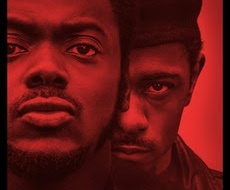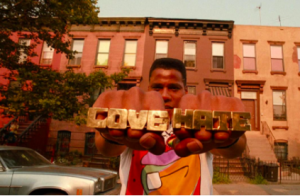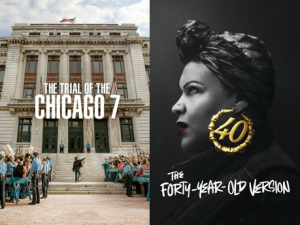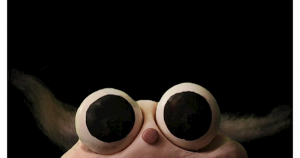“Judas and the Black Messiah” (2021): A revolution, a revolutionary, and a traitor
There’s a bomb under the table, and there’s nothing you can do to stop it

Lakeith Stanfield as Bill O’Neil standing behind Daniel Kaluuya as Fred Hampton.
February 15, 2021
On December 4th, 1969, in between the hours of four and five in the morning, Black Panther Party Chairman Fred Hampton, 21 years old, was murdered in his sleep, in his own home, by the police as part of a conspiracy by the FBI.
Alfred Hitchcock has a famous story regarding the fundamentals of suspense. To paraphrase it, he posits a scene of a bunch of people at a table. After a couple minutes of chatter, “BOOM” — a bomb goes off. For maybe three seconds afterwards, the audience is shocked. Now rewind that scene. Before the people arrive at the table, the audience is shown that a bomb will go off in one hour. Now, for the rest of the scene, the audience is on edge. While the people at the table chatter on, the audience wishes they could reach out and warn the characters, “Look out, there’s a bomb under the table!” When the bomb finally goes off, there’s now an entire scene of build up to that shock.
In “Judas and the Black Messiah”, that first paragraph at the top of this article is the bomb. Knowing that by the end of the film, Fred Hampton won’t be alive anymore changes the context of every interaction with him in the film. Which leads me to the premise of the film. “Judas and the Black Messiah” is about Fred Hampton’s rise to power and the ways he set out to make America a better place, but it’s also about Bill O’Neil, an FBI plant sent to stop Hampton’s organization from the inside. Over the course of the film, Bill rises through the ranks of the Black Panthers, becomes closer with Hampton, and is given increasingly risky and harmful objectives by the FBI.
This is probably the first mainstream feature film I’ve seen which is completely on the side of the Black Panther Party, and the film plays with that pretty brilliantly. One of the opening scenes has a higher up in the FBI speak of the Panthers in exactly the way that many people, even today, view them: as terrorists. Throughout the film, Bill’s boss Roy Mitchell, reiterates the talking point that the Panthers were “just as bad as the KKK”. The film repeatedly demonstrates that this is patently untrue. The Panthers were revolutionary, yes, but only because the people who sought to subdue them were so oppressive. Throughout the film, the Panthers are shown operating a successful free meal program, educating poor kids, and making connections between many different activist groups, black and white. Of course, because of the aforementioned bomb, this serves a double purpose. While it’s inspiring to see the work the Panthers accomplished under the leadership of Hampton, it adds to the tension, because now you’re made even more aware of what is to be lost.
As much as I’ve made this film out to be about Hampton’s near messionic role in the Civil Rights movement, it’s as much a thriller about Bill’s operation as it is about Hampton. Bill’s journey is tense, inspiring, and ultimately tragic, because while he becomes more and more involved in and inspired by Hampton’s cause, the audience is always aware that Bill will inevitably be Hampton’s “Judas”. What really pulls this all together is the performance of Bill’s actor Lakeith Stanfield, which is layered in a way that makes him both a likable audience surrogate while he learns about the Panthers and a deeply conflicting character when he has to do what we know is morally wrong.
So the script is brilliant, but that’s nothing to mention the excellent presentation. The framing, color, and camera movement all scream classic Scorsese gangster flicks like “Goodfellas” (1990), “Casino” (1995), and “The Departed” (2006), and it’s glorious. While the compositions aren’t necessarily full of depth and nuance, that doesn’t really matter, because they communicate emotions incredibly well. With that said, though, I won’t deny there are certainly some moments of real visual brilliance in the film; whether they’re more the work of the director or the editor, I can’t say. This might seem a little nitpicky, but despite the incredibly slick presentation, I won’t deny that sometimes the scenes which relied on blue light as the main light source looked really cheap. It’s really strange too, considering that the rest of the film looks magnificent, but there must be something about the way the bluer tones played off the actors’ skin or the surrounding environment which made it look really unpleasant to me, most notably near the beginning when there’s a press conference that uses a projector.
On the whole though, despite some visual and occasionally tonal hiccups, “Judas and the Black Messiah” is phenomenal. It takes the horrible reality of an inspiring man’s death and turns it into one of the most entertaining films in recent memory while still delivering a gut punch of a finale. The director, Shaka King, is a name you have to look out for from now on, because I think I can pretty confidently say he’s going to be the next prominent big-budget director. Check out “Judas and the Black Messiah” on HBO Max; it’s incredible.








